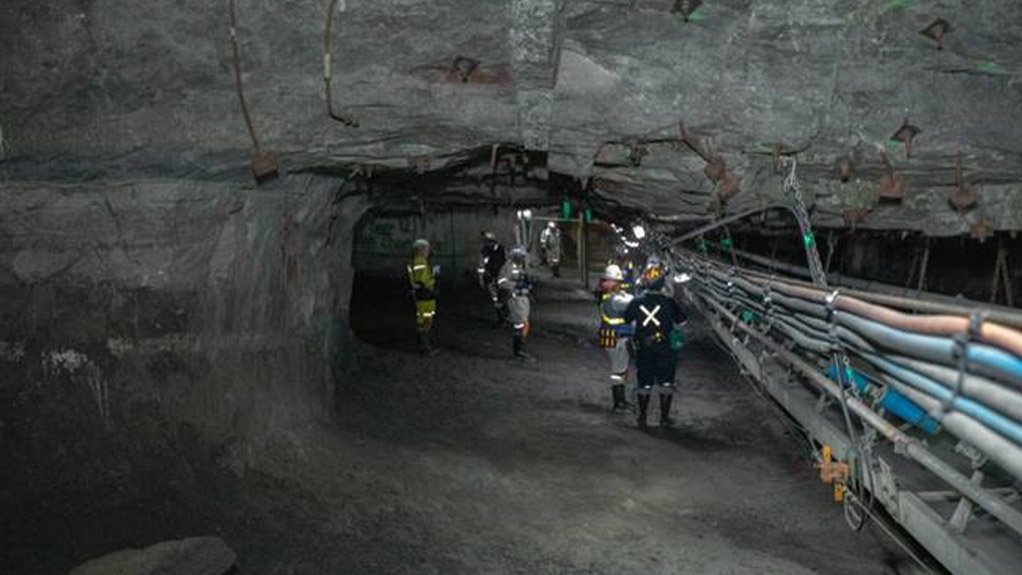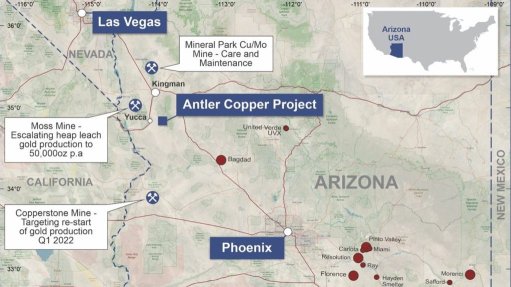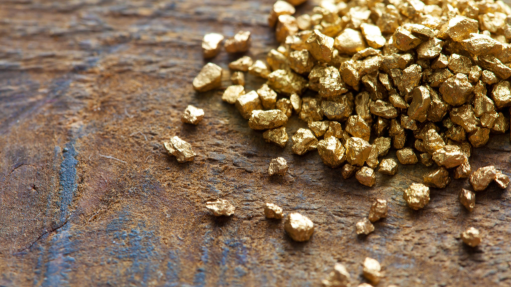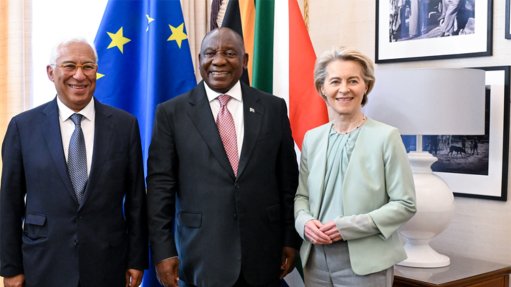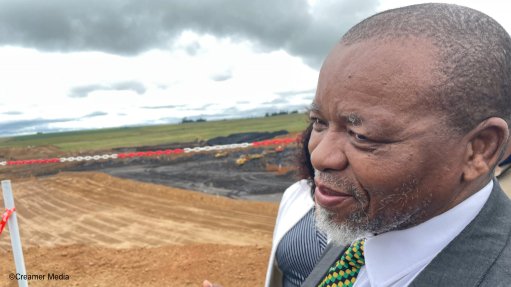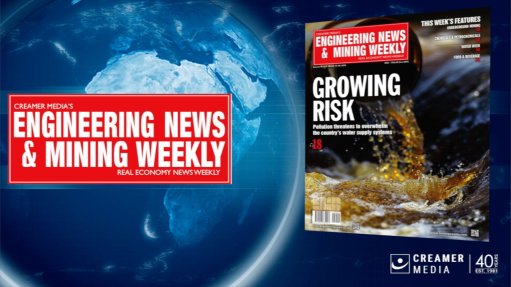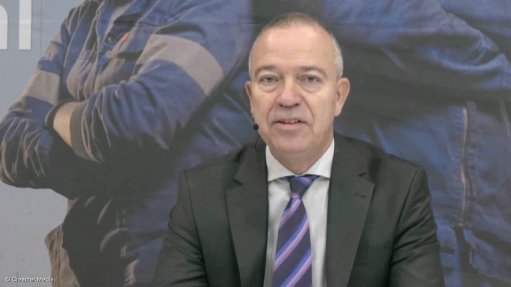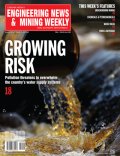Mining revenue decreases, but opportunities abound in critical minerals, beneficiation
The past year has seen a regression in performance and shareholder returns for South Africa mining companies, professional services firm PwC South Africa’s ‘2023 SA Mine: Adapt to thrive’ report states.
This fall off from record levels experienced since the post-Covid-19 economic rebound is owing to several changes across the industry, including productivity and infrastructure constraints, decreases in the prices of certain minerals and increases in input costs.
“The amalgamation of these factors has resulted in a decrease in profits and operating cash flows experienced by South African mining companies. However, strong balance sheets have enabled miners to increase investment into operations and pay dividends,” PwC Africa Energy, Utilities and Resources leader Andries Rossouw says.
Revenue in rand terms decreased by 5% between June 2022 and June this year.
Platinum group metals (PGMs) continued to be the biggest contributor to the total industry revenue, followed by coal. PGMs revenue decreased by 33%, followed by iron-ore, which decreased by 22% and coal by 12%. Chrome experienced a good year with a 38% increase in revenue.
The results of PGM producers have been adversely impacted on by feed and yield problems, as well as the fact that PGM prices are under pressure.
The South African mining industry failed to maintain production levels from the previous year as the government searched for a solution to the country’s persistent power shortages. Year-on-year, overall production dropped by 5.4%.
Total market capitalisation decreased to R1.09-billion from R1.31-billion as at June 30, 2022. This was mainly attributable to the decrease in market capitalisation of companies within the coal and PGM sectors.
Outlining the results of the report in a virtual briefing on October 3, Rossouw averred that the weak rand provided bolstered revenue for mining companies, adding that, without this, the challenges facing the industry would have resulted in mining companies being in severe strife.
However, he pointed out that the weak rand did negatively affect input costs of key chemicals, materials and equipment required for operations.
Operating expenses, excluding metal purchases, increased by 11%, reflecting the above-inflation increases in energy costs (electricity and fuel), as well as chemicals and labour costs.
As plans and executions towards net zero unfold, PwC South Africa Energy, Utilities and Resources partner Vuyiswa Khutlang pointed out that there was concern by certain mining companies about the viability and sustainability of their operations.
However, she noted that, for South Africa, the opportunities could be found in the greater emphasis on securing critical minerals for global decarbonisation efforts.
“Southern Africa has some of the critical metals needed, and it is important for the region to look at opportunities and take advantage of them. To take advantage of these opportunities will require significant cooperation between public and private stakeholders,” she emphasised.
The report shows that the global economy’s pursuit of carbon neutrality hinges on specific minerals such as copper, PGMs, lithium, nickel, cobalt and rare earths.
The rising demand for these ‘Big Six’ energy metals poses a supply challenge on a global scale. To mitigate this risk, increasing the production of critical energy metals in Southern Africa can enhance global supply diversity, while growing the local and regional economy, PwC said.
Rossouw added that beneficiation held opportunities for the country, with the value to be derived from this considerably higher than that of only mining the input materials used in the production of finished products.
However, he pointed out that this was also challenging, as it required electricity and the requisite skills.
Therefore, this also required partnerships to unlock the value, he noted.
Other important points from the report include that all mining stakeholders need to collaborate to establish a plan for life after mine closure.
Moreover, entering into a phase of economic uncertainty means that miners should use their strong balance sheets to capitalise on growth opportunities, PwC advised.
The importance of a regulatory environment that is comparable with that of other countries was also noted as key for investment.
PLANNING AHEAD
With the reserves of certain minerals also shrinking, Khutlang highlighted the need for mining companies and governments to develop strategies to safeguard communities that are dependent on mining operations.
She called for a transitioning of communities from being dependent on mines, reskilling employees and rehabilitating mines.
“This is especially important as some provinces have as little as six years of mining left based on currently declared reserves,” Khutlang warned.
Risks to mining business and the wider industry are also noted to include electricity constraints, logistical constraints for bulk commodity exports, above-inflationary cost pressures, fluctuations in commodity prices and exchange rates, challenges with illegal mining jeopardising the safety and viability of some mining operations, and a shortage of critical skills within the sector.
Considering these challenges, and the fact that investors have investment options other than South Africa, Khutlang said an important question to consider was ‘how many years of mining can South Africa expect to have for certain key commodities such as gold, coal, iron-ore and PGMs?’ It was noted that a lack of exploration and the lag between investment decisions and new production could hamper long-term sustainability of the industry.
As of June 30, South Africa had about 68-milllion ounces of gold reserves declared as proven and probable from all operational mines included in the report.
Based on the reserves declared the gold industry is expected to exist in South Africa for about 27 years, with many of the mines coming to an end before 20 years.
As of June 30, there are seven iron-ore mines operated by three different companies. The total reserve for these mines equates to 696.48-milllion tonnes.
At current production rates, this translates roughly into 13 years left of iron-ore mining in South Africa. Of the total reserves detailed above, about 80% can be attributed to only two mines.
As of June 30, there is an estimated 5.11-billlion tonnes of coal reserves from operational mines.
Depletion rates indicate that there are about 41 years left of mining.
As of June 30, there are about 261-milllion ounces of platinum, palladium, rhodium and gold (4E) in reserves from operational mines.
Based on the most recent 12-month depletion rates, there are about 38 years left of PGMs mining from operating mines in South Africa.
The report also highlights that PGMs will play a key role in the efforts to decarbonise industries.
In South Africa, although mining in the North West may indicate fewer years of available reserves than Limpopo, given the bulk of South Africa’s refining capacity, companies with refining capabilities will be able to continue maintaining a footprint within the province.
The report also points out that at an overall level, it can be concluded that, except for iron-ore miners, most South African miners have a degree of flexibility and optionality for converting exclusive resources into reserves.
“Investment in the future of operations has increased, while continuing to return value to shareholders through dividends, even though profits have decreased. Miners have continued to invest in projects in South Africa, with the largest increase identified in capital spending on assets year-on-year, from 18% in 2022 to 37% in 2023,” Rossouw said.
Miners have opted to retain less of their funds to support new capital investments. There are, however, early signs that the significant drop off in prices of PGMs and coal from record prices could limit future investments.
Comments
Press Office
Announcements
What's On
Subscribe to improve your user experience...
Option 1 (equivalent of R125 a month):
Receive a weekly copy of Creamer Media's Engineering News & Mining Weekly magazine
(print copy for those in South Africa and e-magazine for those outside of South Africa)
Receive daily email newsletters
Access to full search results
Access archive of magazine back copies
Access to Projects in Progress
Access to ONE Research Report of your choice in PDF format
Option 2 (equivalent of R375 a month):
All benefits from Option 1
PLUS
Access to Creamer Media's Research Channel Africa for ALL Research Reports, in PDF format, on various industrial and mining sectors
including Electricity; Water; Energy Transition; Hydrogen; Roads, Rail and Ports; Coal; Gold; Platinum; Battery Metals; etc.
Already a subscriber?
Forgotten your password?
Receive weekly copy of Creamer Media's Engineering News & Mining Weekly magazine (print copy for those in South Africa and e-magazine for those outside of South Africa)
➕
Recieve daily email newsletters
➕
Access to full search results
➕
Access archive of magazine back copies
➕
Access to Projects in Progress
➕
Access to ONE Research Report of your choice in PDF format
RESEARCH CHANNEL AFRICA
R4500 (equivalent of R375 a month)
SUBSCRIBEAll benefits from Option 1
➕
Access to Creamer Media's Research Channel Africa for ALL Research Reports on various industrial and mining sectors, in PDF format, including on:
Electricity
➕
Water
➕
Energy Transition
➕
Hydrogen
➕
Roads, Rail and Ports
➕
Coal
➕
Gold
➕
Platinum
➕
Battery Metals
➕
etc.
Receive all benefits from Option 1 or Option 2 delivered to numerous people at your company
➕
Multiple User names and Passwords for simultaneous log-ins
➕
Intranet integration access to all in your organisation



